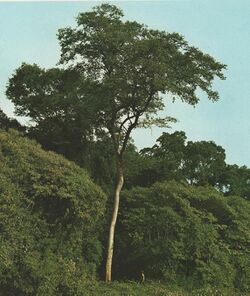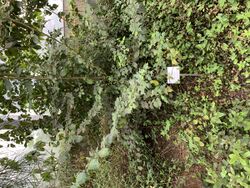Biology:Maclura tinctoria
| Maclura tinctoria | |
|---|---|

| |
| In Argentina | |
| Scientific classification | |
| Kingdom: | Plantae |
| Clade: | Tracheophytes |
| Clade: | Angiosperms |
| Clade: | Eudicots |
| Clade: | Rosids |
| Order: | Rosales |
| Family: | Moraceae |
| Genus: | Maclura |
| Species: | M. tinctoria
|
| Binomial name | |
| Maclura tinctoria (L.) Steud.
| |
| Synonyms[2] | |
| |
Maclura tinctoria, known as old fustic and dyer's mulberry,[3] is a medium to large tree of the Neotropics, from Mexico to Argentina. It produces a yellow dye called fustic primarily known for coloring khaki fabric for U.S. military apparel during World War I.[citation needed] This dye contains the flavonoid morin.[4] It is dioecious, so both male and female plants are needed to set seed.[5]
The leaves can be used to feed silk worms.[6]
Old fustic is not to be confused with young fustic (Rhus cotinus) from southern Europe and Asia, which provides a more fugitive colour.
Dyeing
Fustic is a bright yellow dye that is very color-fast when used with mordants. It is frequently combined with other dyestuffs and various mordants to produce a range of yellow and greenish colors:[3]
- With woad or indigo: bright or Saxon greens
- With bichromate of potash: old gold
- With logwood and bichromate of potash: greenish yellows
- With copper sulfate: olive greens
- With ferrous sulfate: dark greens
References
- ↑ Rivers, M.C.; Barstow, M.; Mark, J. (2017). "Maclura tinctoria". IUCN Red List of Threatened Species 2017: e.T61886731A61886745. doi:10.2305/IUCN.UK.2017-3.RLTS.T61886731A61886745.en. https://www.iucnredlist.org/species/61886731/61886745. Retrieved 19 November 2021.
- ↑ {{citation | mode = cs1 | title = Maclura tinctoria | work = Germplasm Resources Information Network (GRIN) | url = | publisher = [[Organization:Agricultural Research ServAgricultural Research Service (ARS), United States Department of Agriculture (USDA) | access-date = 17 December 2017 }}
- ↑ 3.0 3.1 Goodwin, Jill (1982). A Dyer's Manual. London: Pelham Books Ltd.. p. 60. ISBN 0-7207-1327-7.
- ↑ "Morus tinctoria". http://onlinedictionary.datasegment.com/word/morus+tinctoria.
- ↑ Leite, Viviane Gonçalves; Mansano, Vidal Freitas; Pádua Teixeira, Simone (2018). "Floral development of Moraceae species with emphasis on the perianth and androecium". Flora 240: 116–132. doi:10.1016/j.flora.2018.01.009.
- ↑ Mabberley, D.J. (1997). The plant book: A portable dictionary of the vascular plants. Cambridge: Cambridge University Press.
Wikidata ☰ Q168042 entry
 |



